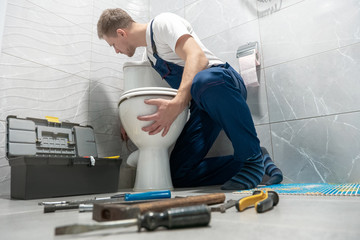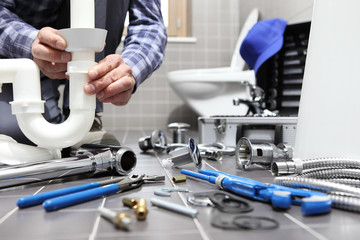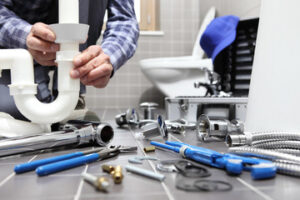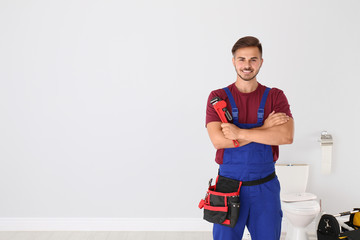A plumbing business can be a profitable venture for those interested in providing repair services, installations, and maintenance to consumers. However, launching and growing a business is not without its challenges.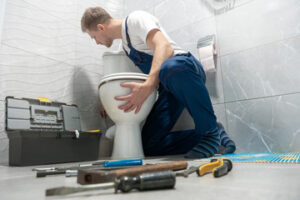
A powerful brand experience can assist in establishing trust and differentiating a plumbing business from the competition. This includes an on-trend style, client service, and visuals that resonate with audiences. Read on Ranger Plumbing Company for more information.
Whether your home or business needs plumbing installation, you should always use a professional plumber. They will be able to give you an accurate assessment of the job and give you options that will work best for your budget. A plumber will also be able to ensure that the installation is done properly so that it doesn’t cause any future problems. If you hire a plumber who is not licensed, you could face expensive fines. Moreover, if the unlicensed plumber does any damage to your property, your insurance company will not cover the cost of repairs.
Plumbers can install a wide range of fixtures, including faucets, toilets, sinks, tubs, and showers. They can also help with new construction projects by laying water supply, drainage, and gas pipes. They can even help with major remodeling projects by installing new fixtures and moving existing ones. They also provide services such as drain cleaning, clog removal, and water heater repair.
The most common residential plumbing service is repair and replacement of pipes, fixtures, and appliances. This includes repairing or replacing sinks, bathtubs, toilets, and water heaters. It can also include rerouting or replacing sewer lines and other underground pipes.
Another common plumbing service is repairing or replacing outdoor pipes, such as those for sprinkler systems and gutters. This can be an important part of preventing flooding and water damage to your home or commercial building. Plumbers can also inspect and maintain your home’s venting system, which is important for preventing dangerous gas buildup.
Many plumbing companies offer emergency services, which are available 24 hours a day for customers who need immediate assistance with a problem such as a clogged toilet or leaking pipe. These services can be very beneficial for homeowners, as they can prevent costly damage and help save time and money.
Starting a plumbing business can be a great way to make a good income. However, it requires a lot of energy and effort to keep the business running smoothly. It’s also important to plan ahead and set up business structures and accounting systems that will allow you to track your income, expenses, and other important financial information. You can choose from a variety of business models, including sole proprietorships, partnerships, and LLCs. Consulting with a legal professional can help you select the right one for your needs.
Plumbing Repair
Plumbing is a vital service that ensures clean water for drinking, bathing, washing and cooking. It also involves the sewage system that removes wastes and prevents the spread of disease and infection. If you notice any problems with your plumbing, it is essential to contact a residential plumbing contractor right away. These professionals can handle a wide variety of plumbing repairs, from minor to major issues. They have the tools, skills and experience to fix the problem quickly and efficiently.
Many people try to tackle plumbing repairs on their own, but this can be dangerous and lead to further damage. If you have a major plumbing issue, such as a leaky pipe or clogged drain, it is best to leave it to the experts. Professional plumbers have the training and tools to get the job done right the first time. They can also spot potential problems and address them before they become bigger issues.
Plumbing services cover everything from unclogging drains and repairing toilets to installing water heaters and rerouting pipes. They can even deal with gas plumbing, which is a crucial aspect of any home. They can install and repair water boilers, heaters, furnaces and washing machines. Plumbing services also include ensuring that all outdoor and indoor pipes are in good condition. They can inspect and maintain the drainage systems, home heating systems, water pressure regulators and all other parts of your house that are connected to the plumbing system.
One of the most important reasons to hire a plumbing company is to avoid costly and complicated repairs. Professionals can diagnose and treat problems before they escalate, which saves you money in the long run. Another advantage of plumbing services is that they provide emergency services, ensuring that you can call them anytime.
Some signs that you need to hire a plumbing company include a faulty water heater, leaking water lines and noisy or rusty pipes. It is also important to hire a plumbing company to handle frozen pipes and septic tank cleaning. A plumber will be able to assess the situation and make recommendations based on your unique needs. They will be able to find the best solution that fits your budget and lifestyle.
Plumbing Maintenance
Plumbing systems work hard day in and day out to provide clean water and dispose of waste. Unfortunately, they can experience issues from time to time. When these problems occur, it’s important to seek out professional plumbing services. These services can include routine maintenance, drain cleaning, repiping, and toilet repairs. Plumbing companies can also help homeowners find energy-efficient plumbing solutions to save money on utility bills.
Regular plumbing maintenance can help prevent expensive plumbing repairs down the road. Plumbing technicians can check for leaks, corrosion, and other potential problems. They can also perform tune-ups to ensure that all parts of the plumbing system are working properly. This can extend the life of pipes, fixtures, and appliances.
Leaks, clogged drains, and other plumbing problems can be very disruptive to your home. However, they can be easily prevented with regular maintenance and routine inspections. Some simple steps, like using drain screens and avoiding the use of chemical drain cleaners, can go a long way in reducing clogs and keeping your plumbing system in good shape.
Another important aspect of plumbing maintenance is ensuring that your home’s venting system is in good condition. The venting system consists of pipes that connect to the drainpipes and extend outside the house. It helps to prevent sewer gases from building up inside the plumbing system, which can cause odors and health concerns. A faulty venting system can also lead to water damage and other serious problems.
In addition to plumbing maintenance, a professional plumber can also help with water heater repairs and other common home projects. They can install or replace faucets, toilets, sinks, and other fixtures. They can also help with backflow prevention and water conservation measures.
Plumbing services are essential for ensuring that your home’s water supply is safe and sanitary. With proper care and maintenance, your plumbing systems can last for a long time and keep your home’s water supply clean and healthy. However, you should not wait until a problem arises to call for plumbing services. By hiring a reputable plumber, you can avoid costly repair bills and other disasters.
Plumbing Inspection
Getting plumbing inspection services on a regular basis can help catch problems early, before they turn into major catastrophes. For example, a simple leaky pipe can lead to water damage, rot, mold and mildew, and expensive repairs. When a plumber inspects your pipes and fixtures, they look for signs of wear and tear like rust or corrosion, loose fittings, and more. They may even use a special camera to see inside your pipes for a more detailed assessment.
A good plumbing company will also provide routine maintenance to keep your pipes and fixtures working properly. This can include clog removal, drain cleaning, water heater service and more. They will check for any leaks or damage, and repair them right away. They will also lubricate the joints to prevent them from leaking or cracking. They can also install or replace any water lines or appliances that are damaged.
Before you hire a plumber, make sure that they are licensed and insured. A license is important because it shows that the plumber has been trained to work safely and follow industry standards. In addition, an insured plumber is less likely to cause damage to your home or business. If you do decide to work with an unlicensed plumber, be aware that if something goes wrong, your insurance may not cover the damages.
The best plumbing companies have a strong customer service focus and can meet the needs of both residential and commercial customers. They are experienced in a variety of plumbing projects and have the tools and equipment needed to handle any job. They will also take the time to understand your unique plumbing needs and find solutions that are right for you.
When you’re ready to hire a plumber, start by creating a job description that clearly outlines the qualifications and skills required. Then, prepare interview questions that will help you assess the candidate’s experience and reliability. Avoid asking personal questions that could be used to discriminate against a person’s age, religion, race or marital status. You can also ask about the candidate’s attitude and work ethic during the interview.

